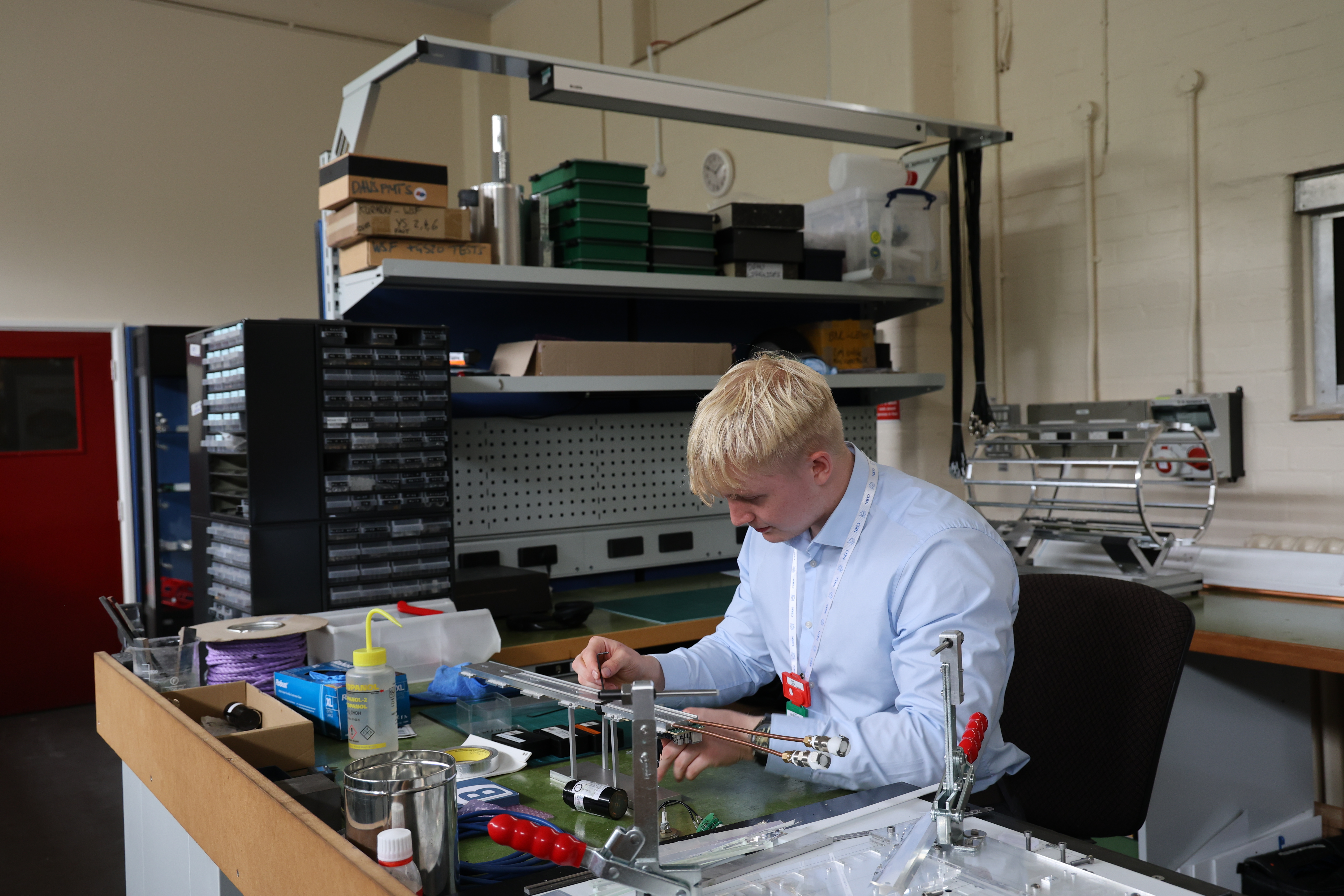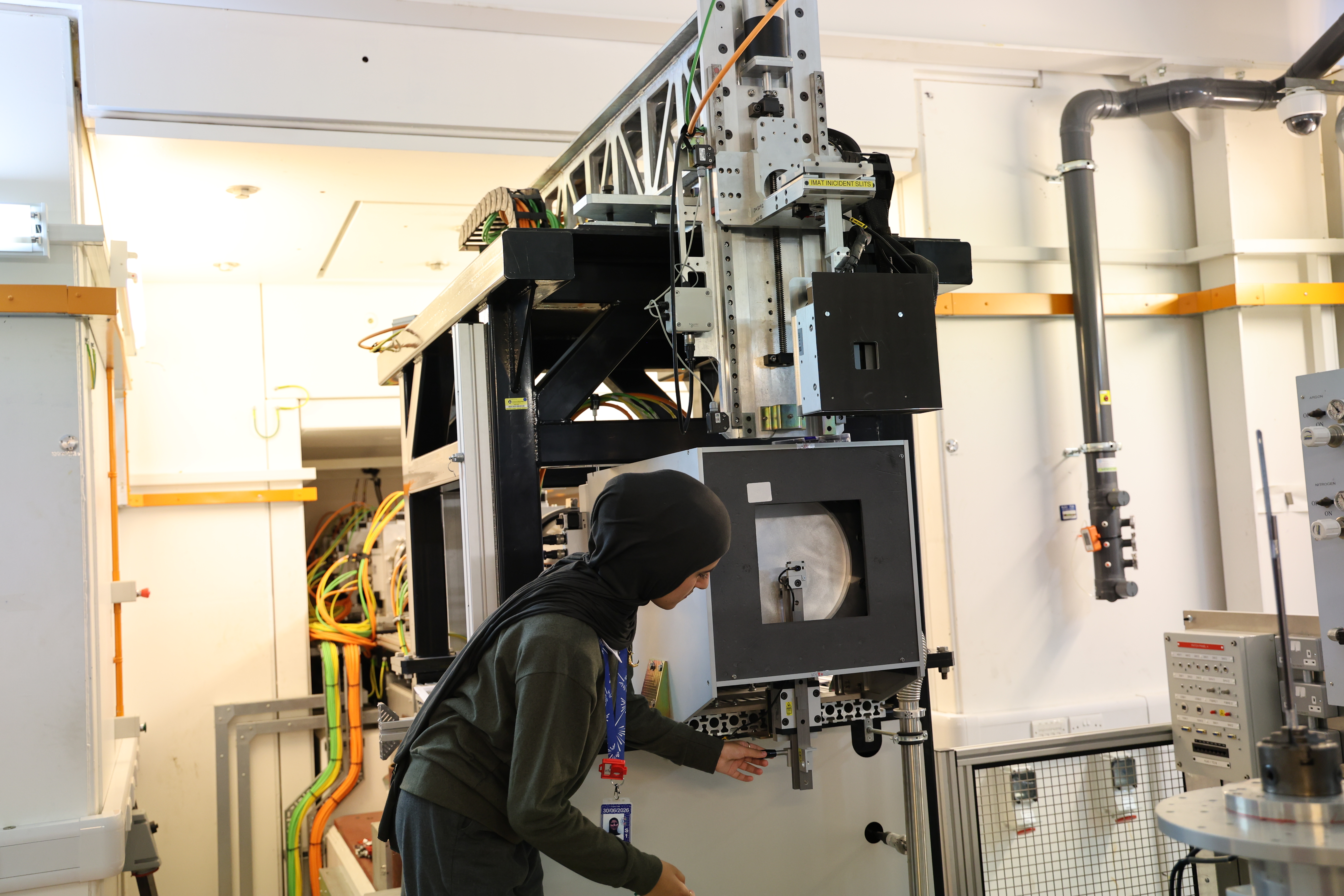At ISIS, placement students are given the chance to gain practical experience and contribute to meaningful projects. Every year, students from across the country join our teams to apply their knowledge, develop new skills, and learn from experts in the field. Our placements students don't just observe, they help make things happen.
To give you a real sense of what it's like, as the ISIS Science Communication Placement student, I had the opportunity to speak to some of the placement students about their journey so far, the projects they are working on and tips for new starters.
If you are interested about what a year at ISIS could look like, read on and find out why we think it's an experience worth taking!
Ben Thompson
Ben joined ISIS as a Detector Scientist doing an integrated master's in physics at the University of Bristol.

![]()
Ben is currently working to help with upgrade of the cutting-edge detector, Super MuSR, which plans to improve the spatial and timing resolution of the current detector. His role involves designing and building of various experimental rigs in order to test various parts of the detector as they are made by the production team, as well as testing out these parts on the Muon Beamline.
They chose ISIS because of its reputation for world-class research and its unique facilities that support cutting edge research in particle physics, materials science and many other fields. The opportunity to contribute on a real detector upgrade project and gain experience in this field was a key motivating factor.
Learn from Ben as they reflect on their experience and share valuable tips!
What is your favourite part of your placement so far?
How hands on and involved I get to be with the project. I am not just sitting in an office all day! I'm actively contributing to real experimental work, which makes the role both interesting and rewarding!
What do you hope to achieve by the end?
I hope to have significantly contributed to the Super MuSR build project while developing my scientific expertise, problem solving skills. As well as becoming adept in working in a collaborative environment within physics.
Tips for new starters
Before the interview be sure to have a general idea of how the site works (there are plenty of good YouTube videos and websites). Make sure to ask questions at the end of your interview, possibly a tricky question about your role you don't quite understand, or general information about work at ISIS. It shows a keen interest and can be a chance to learn more about your role!
Isabella Vaughan
Isabella is studying Physics at the University of Bath. She is working in Public Engagement at ISIS.

Isabella works in Public Engagement at ISIS, so her day-to-day can be quite varied. They work to promote ISIS science and engineering, as well as STEM more broadly, to a range of audiences, including school students and the general public. This can be through a variety of channels, including events, educational activities, workshops and articles, aimed at different audiences, including those that are hard-to-reach or under-represented in STEM fields.
Learn from Isabella as they reflect on their experience and share valuable tips!
What is your favourite part of your placement so far?
One highlight would be our visit to a local primary school. We ran a session on light and colour for two Year 3 classes. It was great to see how interested and engaged they were with the activities and I'm looking forward to more school visits this year.
Another highlight would be attending the BIG Conference on STEM engagement at the Royal Institution. I met so many people working in Public Engagement, and it was really interesting to hear about their career paths. I loved being able to share ideas and learn from their experience.
What do you hope to achieve by the end?
I hope to take advantage of all the unique opportunities here at ISIS and learn as much as I can from as many people as possible.
Tips for new starters
My tip for new starters is to push yourself outside of your comfort zone and take as many opportunities as you can". Looking back on her placement journey, she also shares, “I wish I had known how friendly everyone is! I had no need to be nervous when I started because everyone I have met and worked with has been very approachable and willing to help.
Isha Rajadhyax
Isha is working as a Bio-deuteration Support Scientist at ISIS. She is studying BSc in Biochemistry from Imperial College London.

Isha's role involves using biological systems to produce deuterated compounds such as proteins and even cholesterol, which can then be studied using neutron scattering techniques. To her, the neutron beam is incredibly interesting as it can be used in so many fields of research. She applied for this role because she was excited by its use in characterising biological molecules or complexes and wanted to explore this field further.
Learn from Isha as they reflect on their experience and share valuable tips!
What is your favourite part of your placement so far?
Being introduced to new lab techniques and learning so many new things, even in just the first few weeks. Additionally, all the researchers I have met so far have been incredibly welcoming and you can gain insight into adjacent fields just by having conversations with them, which has enabled me to learn so much.
What do you hope to achieve by the end?
I hope to achieve key goals of my project, including the production of biodeuterated proteins and cholesterol. Additionally, I hope to strengthen my technical skills, while actively engaging with the diverse ISIS community. By connecting with researchers across disciplines, I hope to gain a deeper understanding of the various scientific fields that contribute to this collaborative environment.
Tips for new starters
ISIS is hub of innovation and research, so connecting with the community and asking questions teaches you so much. Applying to a project that you are passionate about is important. My project really excites me, hence delving deep into it and doing my research has been an incredibly enjoyable experience.
Zuhal Yossefi
Zuhal is doing MEng Mechanical Engineering at Imperial College London. She is working as a Mechanical Engineer at ISIS.

Zuhal is part of the engineering and imaging team, working on the loading rigs for Engin-X, as well as supporting various smaller engineering projects for IMAT. Her work so far involves coming up with solutions, designing mechanical components, and assisting with experimental setup.
Learn from Zuhal as they reflect on their experience and share valuable tips!
What is your favourite part of your placement?
Seeing the instruments in person was amazing; everything is so beautifully designed. So far, I've been working on different, small projects, and I'm really excited to see my designs come to life. I've also really enjoyed meeting other students and colleagues and getting to know them.
What do you hope to achieve by the end?
I want to gain real world engineering experience and practical skills, as well as an insight into the academic research environment. Ultimately, I hope this placement will help me grow into a capable and confident mechanical engineer.
Tips for new starters
Breathe. Everyone is genuinely friendly, supportive, and more than happy to help. Don't be afraid to ask as many questions as you can and get involved with as much as possible to make the most of your year.
My own reflections
The process of an Industrial placement may seem a process filled with excitement, nervousness, rejections, resilience but most importantly a sea full of opportunities to learn from. Ultimately, the journey's of these students show how placements can be transformative equipping individuals with the skills, confidence and perspective needed to thrive by being proactive, resilient and trusting the process.
